README
Node-RED AMQP input and output nodes
node-red-contrib-amqp-ack is a Node-RED package that connects directly to an AMQP server (e.g. RabbitMQ). It contains an input, an output and a configuration node to connect to AMQP exchanges or queues for Node-RED with ack control.
It uses the amqp-ts library for the AMQP connectivity.
Thanks to abreits for release node-red-contrib-amqp
Table of Contents
Installation
If you have installed Node-RED as a global node.js package (you use the command node-red anywhere to start it), you need to install
node-red-contrib-amqp-ack as a global package as well:
$[sudo] npm install -g node-red-contrib-amqp-ack
If you have installed the .zip or cloned your own copy of Node-RED from github, you can install it as a normal npm package inside the Node-RED project directory:
<path/to/node-red>$ npm install node-red-contrib-amqp-ack
Overview
The package contains the following Node-RED nodes:
input: amqp
Subscribes to an AMQP exchange or queue and reads messages from it. It outputs an object called
msg containing the following fields:
msg.payloadis a string or an object containing the content of the AMQP message.msg.topicis a string containing the routing-key of the AMQP message.msg.amqpMessageis an amqp-ts Message object containing the received message.sendto
If a topic is defined in the input node definition, that will be sent as msg.topic instead of the routing key.
In the settings you can only define the exchange type or queue and it's name. If you need to use an exchange or a queue with specific settings you can define the exchange or queue in the topology tab of the AMQP server configuration node. The input node will use the exchange or queue defined in the topology.
You can send to the node msg.readFrom to received dynamically the name of the queue or exchange that will be read.
input: ack
AMQP ack node. Return ack or nack for amqp in queue in the flow when finish the process.
output: amqp
Delivers incoming the message payload to the specified exchange or queue. It expects an object called
msg containing the following fields:
msg.payload: string or an object containing the content of the AMQP message to be sent.msg.topic: string containing the routing-key of the AMQP message to be sent.msg.options: object containing specific AMQP properties for the message to be sent, see the amqplib publish documentation for more information.
If a topic is defined in the output node definition, that will be sent as routing-key instead of the msg.topic. If the msg.payload field does not exist, the whole msg object will be sent.
In the settings you can only define the exchange type or queue and it's name. If you need to use an exchange or a queue with specific settings you can define the exchange or queue in the topology tab of the AMQP server configuration node. The output node will use the exchange or queue defined in the topology.
configuration: amqp-server
Defines the connection to the AMQP server. You can also define in more detail the exchanges and queues that are used in the input and output nodes and even define bindings between exchanges and queues in the topology tab.
topology tab
In the topology tab you can define the AMQP server exchange and queue topology (exchanges, queues and bindings). You define the topology in the JSON editor.
Topology configuration example:
{
"exchanges": [
{"name": "exchange1", "type": "direct", "options": {"durable": false}},
{"name": "exchange2"}
],
"queues": [
{"name": "queue1", "options": {"messageTtl": 60000}},
{"name": "queue2"}
],
"bindings": [
{"source": "exchange1", "queue": "queue1", "pattern": "debug", "args": {}},
{"source": "exchange1", "exchange": "exchange2", "pattern": "error"},
{"source": "exchange2", "queue": "queue2"}
]
};
Prefetch
Only Prefetch
Enable prefetch and limit the number of msg by consumer. Atention: The consumer get the msg it keeps unacked forever.
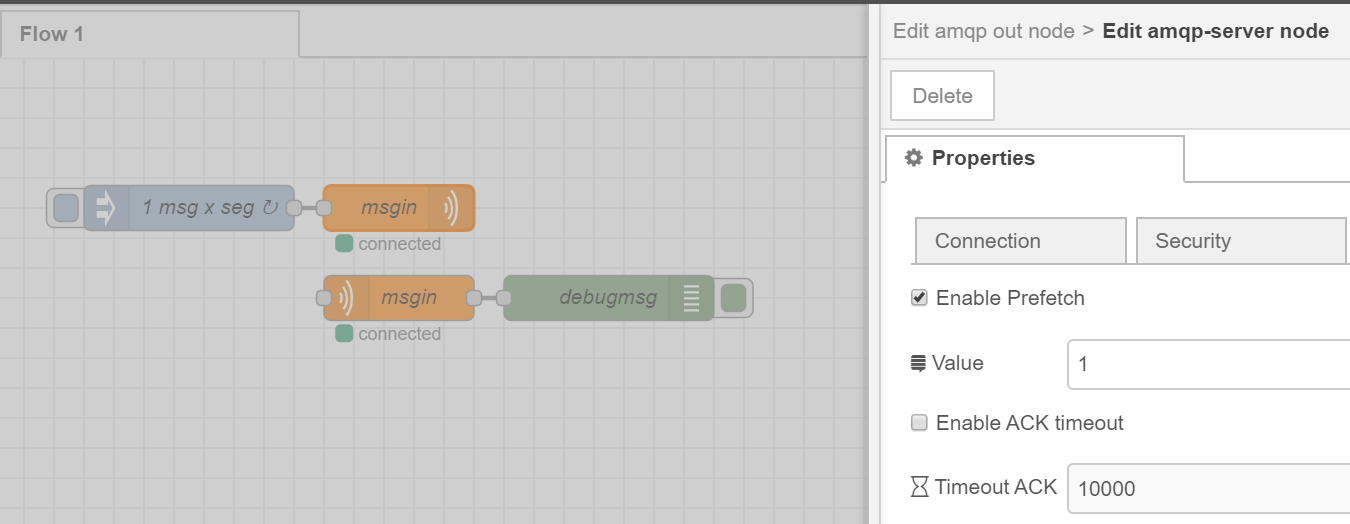
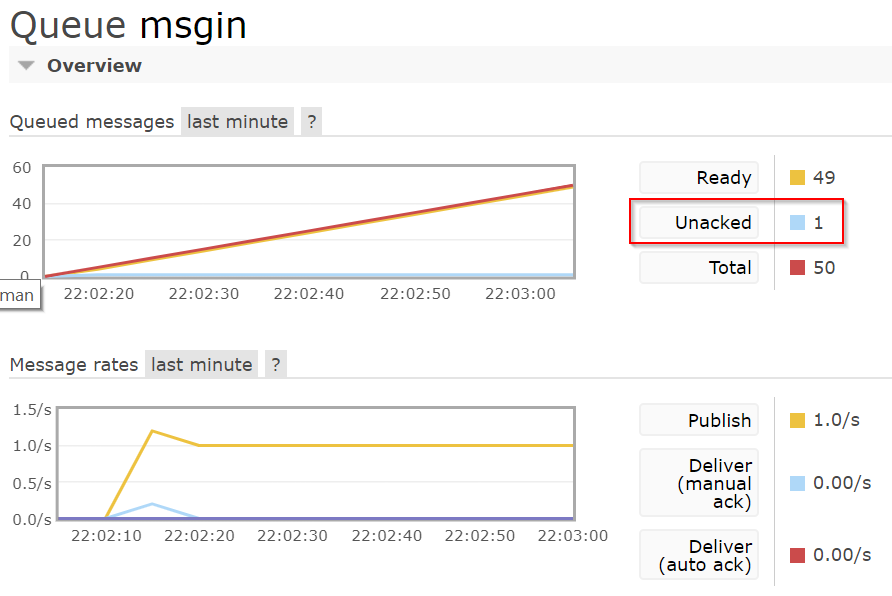
Prefetch with timeout
With prefetch enable, can enable timeout per msg in ms. After the timeout the msg get ACK.
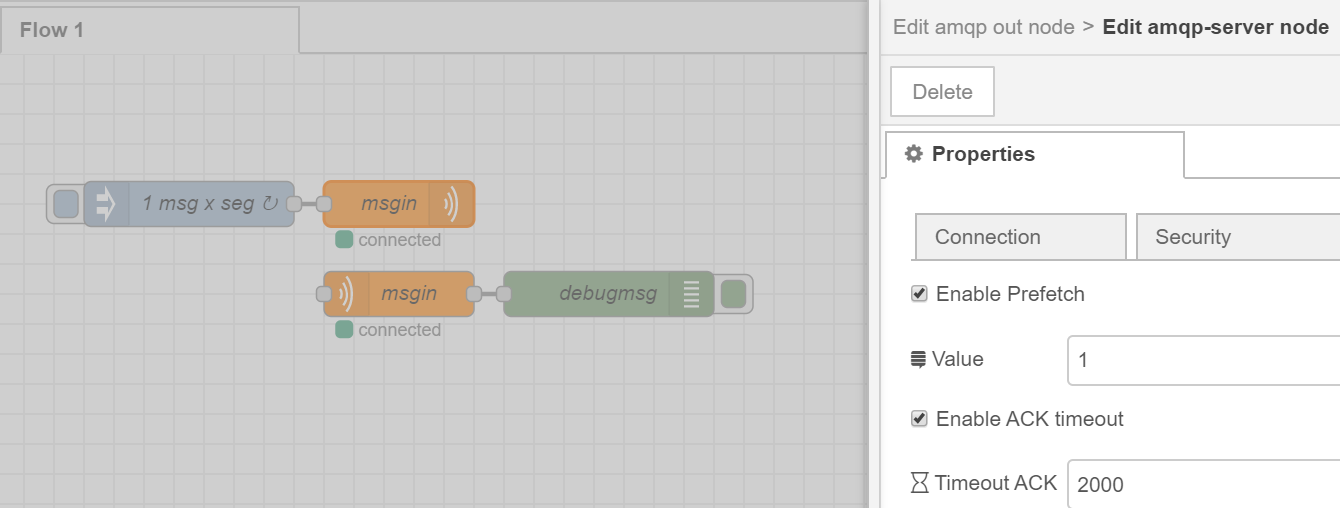
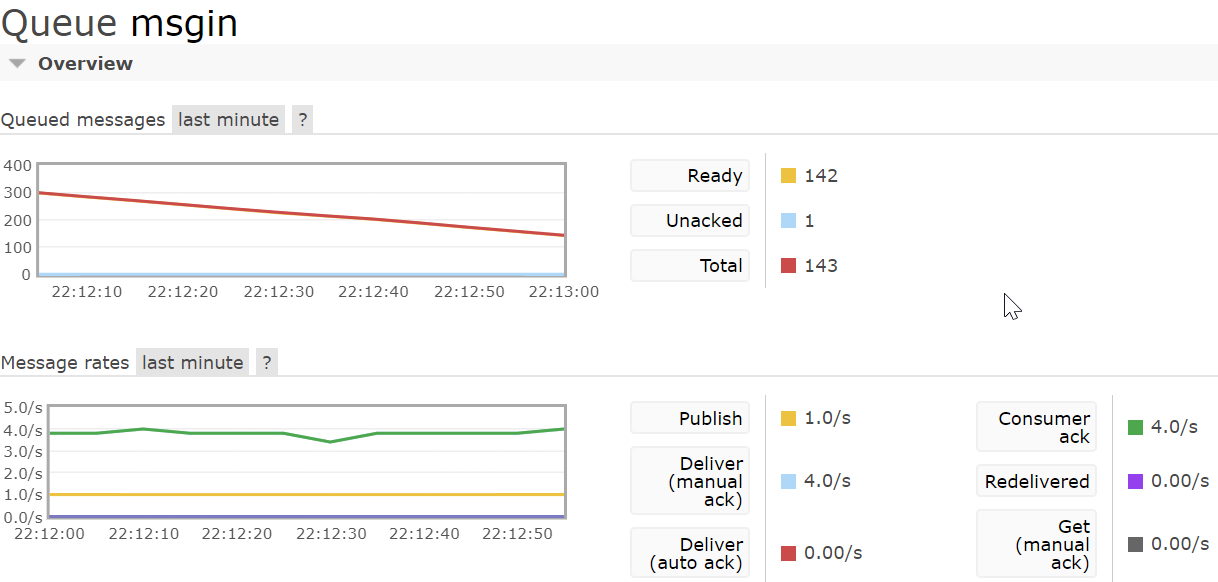
Prefetch with ack node
We can use a node ACK for send the ACK when the process end, without set a fixed time. In this mode, is use a flow variable amqpobjectsacks to keep the tags for each msg, only one input node can use per flow.
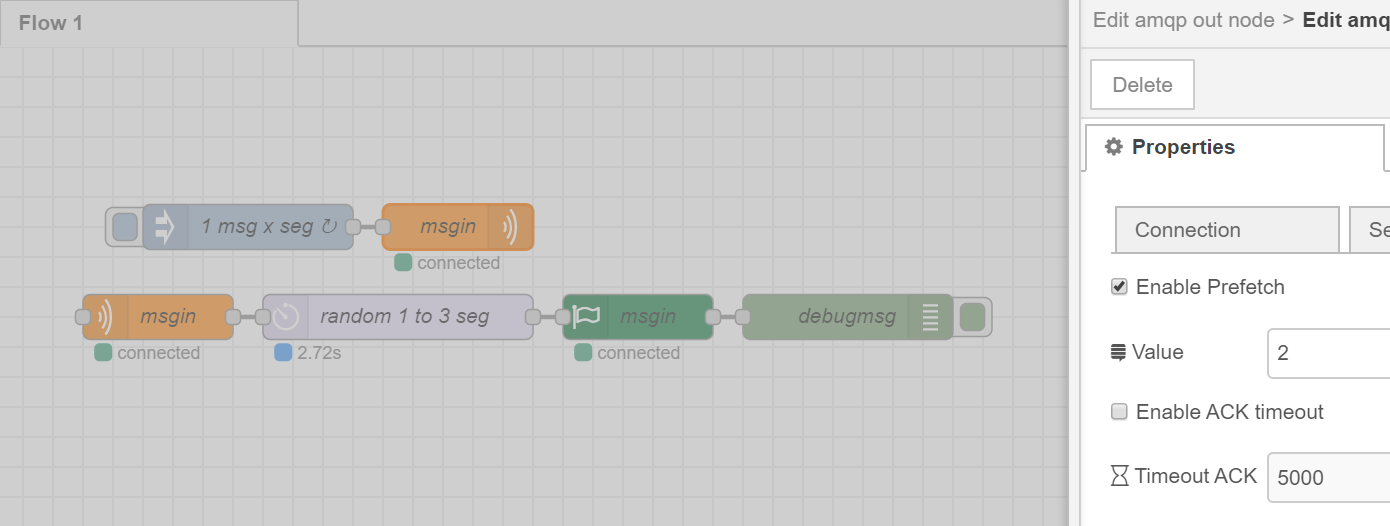
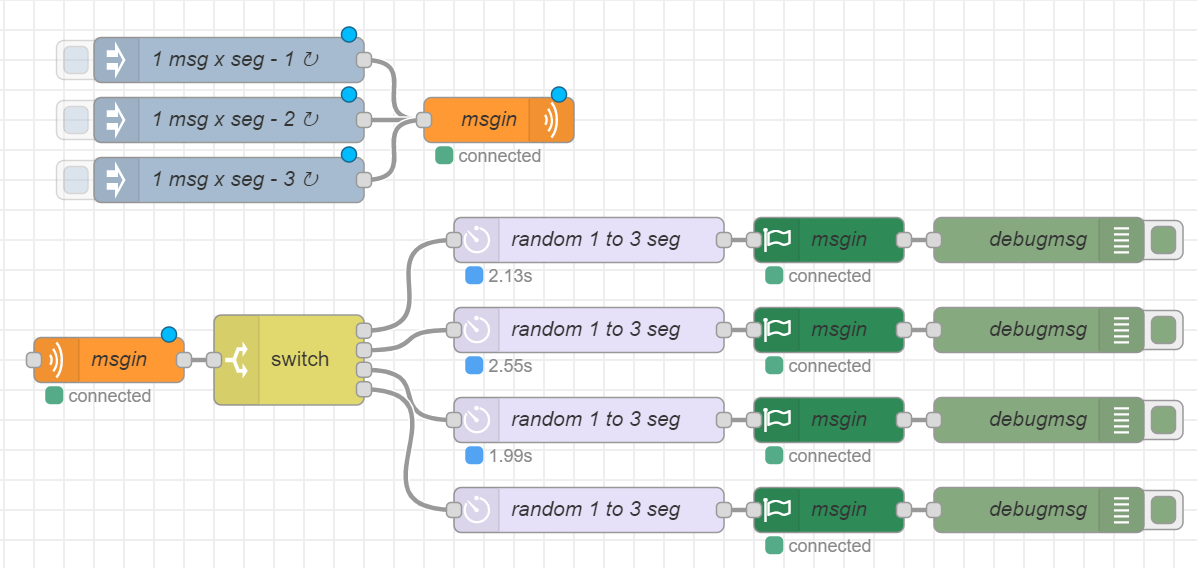
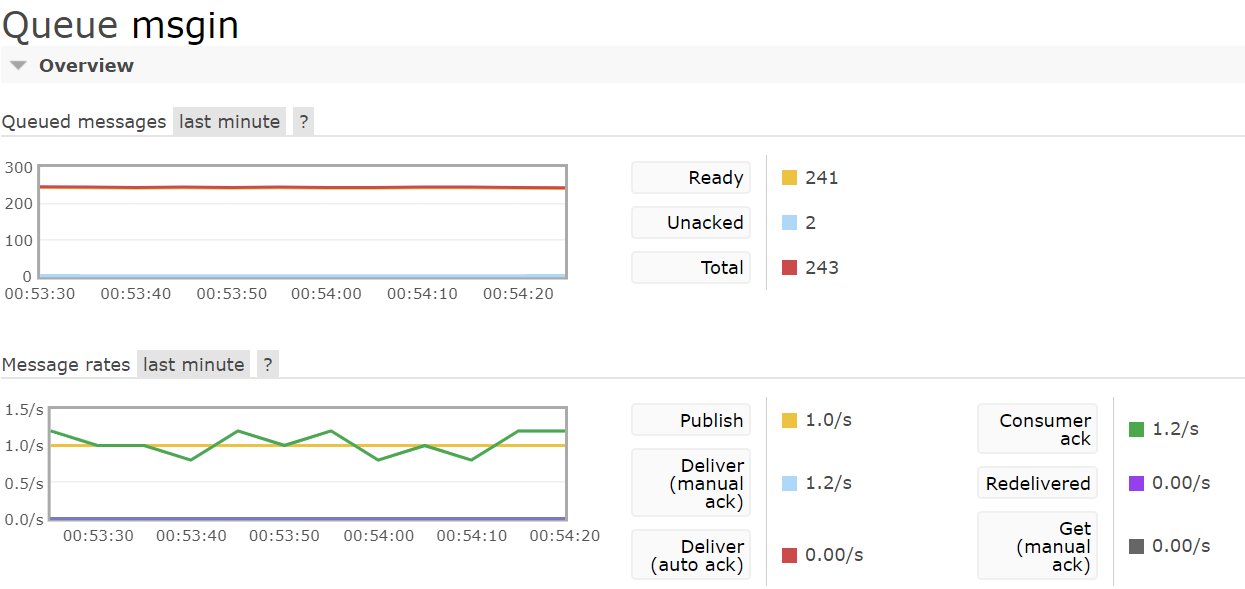
Prefetch with ack node and dynamic set queue
If use msg.readFrom in amqp in, ack node need a switch node for every queue name.
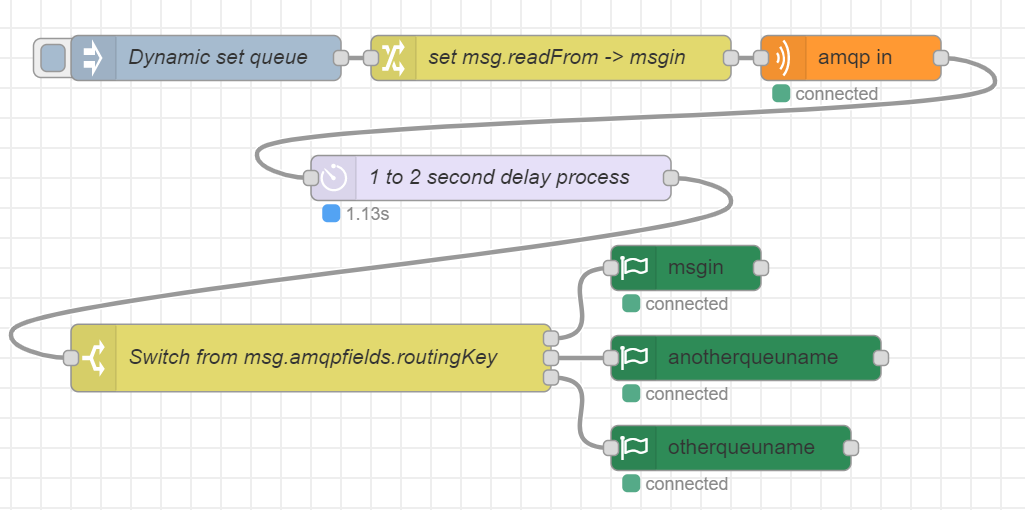
Known issues
- Entering invalid credentials (username/password) in the AMQP configuration node can cause node-red to malfunction
- Package library 'amqlib' is outdated, requiring breaking changes
- Build libraries 'typescript' and 'gulp-typescript' are outdated, requiring breaking changes
- Prefetch with timeout and with ack node can`t use simultaneous
- Prefetch with only one msg sometimes stuck with ack node if have old data in amqpobjectsack
What's new
version 1.1.2
- Encode username and password percent-encoding format (pauldeng)
- Improve the Fast developer section
version 1.1.1
- Change amqpobjectsacks to object map
- FIX declarations & lint code
version 1.1.0
- FIX no more lost acks with high rate message
version 1.0.9
- FIX old values amqpobjectsacks when deploy and the variable is set
- FIX lost acks when channel closed and change consumer tag when reconnect
- FIX lost acks when msg rate is +75msg/seg not recommended
version 1.0.8
- Remove clear amqpobjectsacks when old values, send message instead
version 1.0.7
- FIX messages without objects acks
version 1.0.6
- Add nack
- Change control ack from global to flow
version 1.0.5
- Remove images in package.
version 1.0.4
- Add credits.
- Add info for dynamically set the name of the queue or exchange in input nodes.
version 1.0.3
- enable prefect
version 1.0.1
- bugfix, introduced by v1.0.0: Connections would not establish on startup, but would after a deploy.
version 1.0.0
Use Credentials/Credentials fields descriptions changed to 'Use Local CA File' and 'CA File Location' with accompanying functional change:
The 'CA File Location' field no longer specifies an explicit certificate, but a local disk location to load
This is important as many certs have binary data in them, which is incompatible with a copy/paste in NodeRed GUI.
When a custom CA file location is not specified, an attempt is made to load the default system CA certificate
Currently default supports ubuntu and alpine.
Other distros should contribute their locations to this project as desired, but could still manually enter the location to be able to enjoy the functionality. If you were previously using non-system-default cert text in an AMQP node, this update would be a breaking change.
Some small GUI quality of life improvement to disable/enable TLS related fields when TLS enabled checkbox is exercised
bugfix, 'Enable secure connection' + 'Use Local CA File' checkbox drives whether to use the 'CA File Location' field;
before it would use the field even when the checkbox was unchecked
Library dependencies upgraded to address all non-low vulnerabilities. Remaining low vulnerability will require upgrading typescript and gulp-typescript, along with breaking updates.
version 0.4.5
- Unknown, just documenting this version existed. It is available in NPM, but not documented here
version 0.4.4
- bugfix, topology editor not visible in amqp-server config node
version 0.4.3
- bugfix, fixed routingkey not working in configuration/definition (thanks to exogenesick)
version 0.4.0
- major refactor, made preparations for better testable code:
- javascript source code has been translated to typescript
- gulp build system added
version 0.3.0
- connection to AMQP server now only established when amqp input and/or AMQP output nodes exist
- major refactor and code cleanup
- fixed errors in readme
version 0.2.0
- fixed user credentials not working
- improved readme
version 0.1.0
- initial release
Roadmap
- Resume active maintenance of the project into 2019!
- I would like to see version 1.1.0 aim to accomplish:
- All dependencies upgraded to current
- Test suite in place
Fast developer
- In your host:
- git clone repository (git clone https://github.com/ElGranLoky/node-red-contrib-amqp-ack.git)
- cd node-red-contrib-amqp-ack
- docker build . -f Dockerfile -t gulp:latest
- docker run -v ${PWD}:/src gulp
- docker run -v ${PWD}:/install -p 1880:1880 --name noderedtest nodered/node-red:latest-minimal
- Control + C
- docker exec -it noderedtest bash
- Inside the container noderedtest:
- cd /usr/src/node-red/
- npm install /install
- exit
- In your host:
- docker restart noderedtest
Now you can access http://localhost:1880 and test the node-red-contrib-amqp-ack in nodered running in yout host.